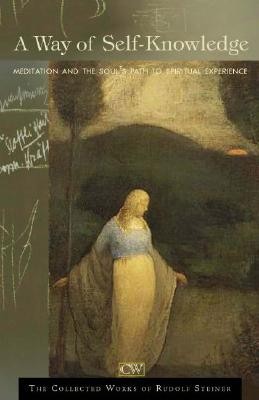| A Way of Self-Knowledge: And the Threshold of the Spiritual World (Cw 16-17) Revised Edition Contributor(s): Steiner, Rudolf (Author), Bamford, Christopher (Introduction by), Schwarzkopf, Friedemann-Eckart (Preface by) |
|
 |
ISBN: 0880104430 ISBN-13: 9780880104432 Publisher: Steiner Books OUR PRICE: $22.50 Product Type: Paperback - Other Formats Published: May 1999 Annotation: Part one, ?A Way of Self-Knowledge, ? contains eight meditations that take the reader on a journey through human experience. Beginning with ordinary experience, Steiner offers ways to imagine and understand the physical body, the elemental (or etheric) body, the elemental world, the Guardian of the Threshold, the astral body, the I-body (or thought body), the nature of experience in suprasensory worlds, and ways of perceiving previous earthly lives. Part two, ?The Threshold of the Spiritual World, ? contains sixteen short chapters in which Steiner provides aphoristic thoughts on trusting one's thinking? cognition of the spiritual world? karma and reincarnation? the astral body and luciferic beings? how to recognize suprasensory consciousness; the true nature of love; and more. |
| Additional Information |
| BISAC Categories: - Religion | Theosophy - Body, Mind & Spirit | Mindfulness & Meditation - Body, Mind & Spirit | Inspiration & Personal Growth |
| Dewey: 299.935 |
| LCCN: 98053149 |
| Series: Classics in Anthroposophy |
| Physical Information: 0.6" H x 5.96" W x 9.28" (0.71 lbs) 208 pages |
| Themes: - Religious Orientation - New Age - Topical - New Age |
| Descriptions, Reviews, Etc. |
| Publisher Description: 2 written works, 1912 & 1913 (CW 16/17) Part one, "A Way of Self-Knowledge" Eight meditations that take the reader on a journey through human experience. Beginning with ordinary experience, Steiner offers ways to imagine and understand the physical body, the elemental (or etheric) body, the elemental world, the Guardian of the Threshold, the astral body, the "I"-body (or thought body), the nature of experience in suprasensory worlds, and ways of perceiving previous earthly lives. Part two, "The Threshold of the Spiritual World" Sixteen short chapters in which Steiner provides aphoristic thoughts on trusting one's thinking, cognition of the spiritual world, karma and reincarnation, the astral body and luciferic beings, how to recognize suprasensory consciousness, the true nature of love, and more. These two complete books together represent Steiner's most personal statements about his own spiritual path. He speaks directly from experiences of cognitive research and explorations. Each of the meditations and aphorisms arises from his spiritual research and demonstrates how such spiritual research is to be undertaken. The "content" is Steiner's own, but readers can discover their own "content." Steiner's method of awareness--his path of attention to one's own experience--is universal and truly human. A Way of Self-Knowledge is a true sequel and complement to the classic of inner development, How to Know Higher Worlds. It lays out in a way that is accessible to anyone the road to self-knowledge and to the world of spirit. CONTENTS Introduction by Christopher Bamford PART ONE: A WAY OF SELF-KNOWLEDGE: MEDITATIONS 1. The Physical Body PART TWO: THE THRESHOLD OF THE SPIRITUAL WORLD: APHORISMS 1. Trust in Thinking. The Nature of the Thinking Soul A Way of Self-Knowledge: And the Threshold of the Spiritual Worldis a translation of Ein Weg zur Selbsterkenntnis des Menschen: In acht Meditationen (GA 16) and Die Schwelle dre geistigen Welt: Aphoristische Ausf hrungen (GA 17). |
Contributor Bio(s): Bamford, Christopher: - Christopher Bamford is Editor in Chief for SteinerBooks and its imprints. A Fellow of the Lindisfarne Association, he has lectured, taught, and written widely on Western spiritual and esoteric traditions. He is the author of The Voice of the Eagle: The Heart of Celtic Christianity (1990) and An Endless Trace: The Passionate Pursuit of Wisdom in the West (2003). He has also translated and edited numerous books, including Celtic Christianity: Ecology and Holiness (1982); Homage to Pythagoras: Rediscovering Sacred Science; and The Noble Traveller: The Life and Writings of O. V. de L. Milosz (all published by Lindisfarne Books). HarperSanFrancisco included an essay by Mr. Bamford in its anthology Best Spiritual Writing 2000.Steiner, Rudolf: - Rudolf Steiner (1861-1925) was born in the small village of Kraljevec, Austro-Hungarian Empire (now in Croatia), where he grew up (see right). As a young man, he lived in Weimar and Berlin, where he became a well-published scientific, literary, and philosophical scholar, known especially for his work with Goethe's scientific writings. At the beginning of the twentieth century, he began to develop his early philosophical principles into an approach to systematic research into psychological and spiritual phenomena. Formally beginning his spiritual teaching career under the auspices of the Theosophical Society, Steiner came to use the term Anthroposophy (and spiritual science) for his philosophy, spiritual research, and findings. The influence of Steiner's multifaceted genius has led to innovative and holistic approaches in medicine, various therapies, philosophy, religious renewal, Waldorf education, education for special needs, threefold economics, biodynamic agriculture, Goethean science, architecture, and the arts of drama, speech, and eurythmy. In 1924, Rudolf Steiner founded the General Anthroposophical Society, which today has branches throughout the world. He died in Dornach, Switzerland. |